Annotated Bibliography: Social Participation Research and Analysis
VerifiedAdded on 2020/06/06
|8
|2426
|30
Annotated Bibliography
AI Summary
This annotated bibliography provides a comprehensive analysis of six articles centered on the theme of social participation. The articles explore various facets of participation, including its political dimensions, its role in social inclusion, and its application in diverse contexts such as education, healthcare, and community development. Each article is summarized, and its key arguments and methodologies are critically evaluated. The synthesis highlights the interconnectedness of participation across different domains, emphasizing its importance in shaping individual and societal outcomes. The bibliography underscores the multifaceted nature of participation, its impact on different segments of society, and its significance in research. The author reflects on the research's impact on their understanding of social participation, emphasizing its relevance for future research and practical application. The annotated bibliography provides a valuable resource for understanding the nuances of social participation across various disciplines.
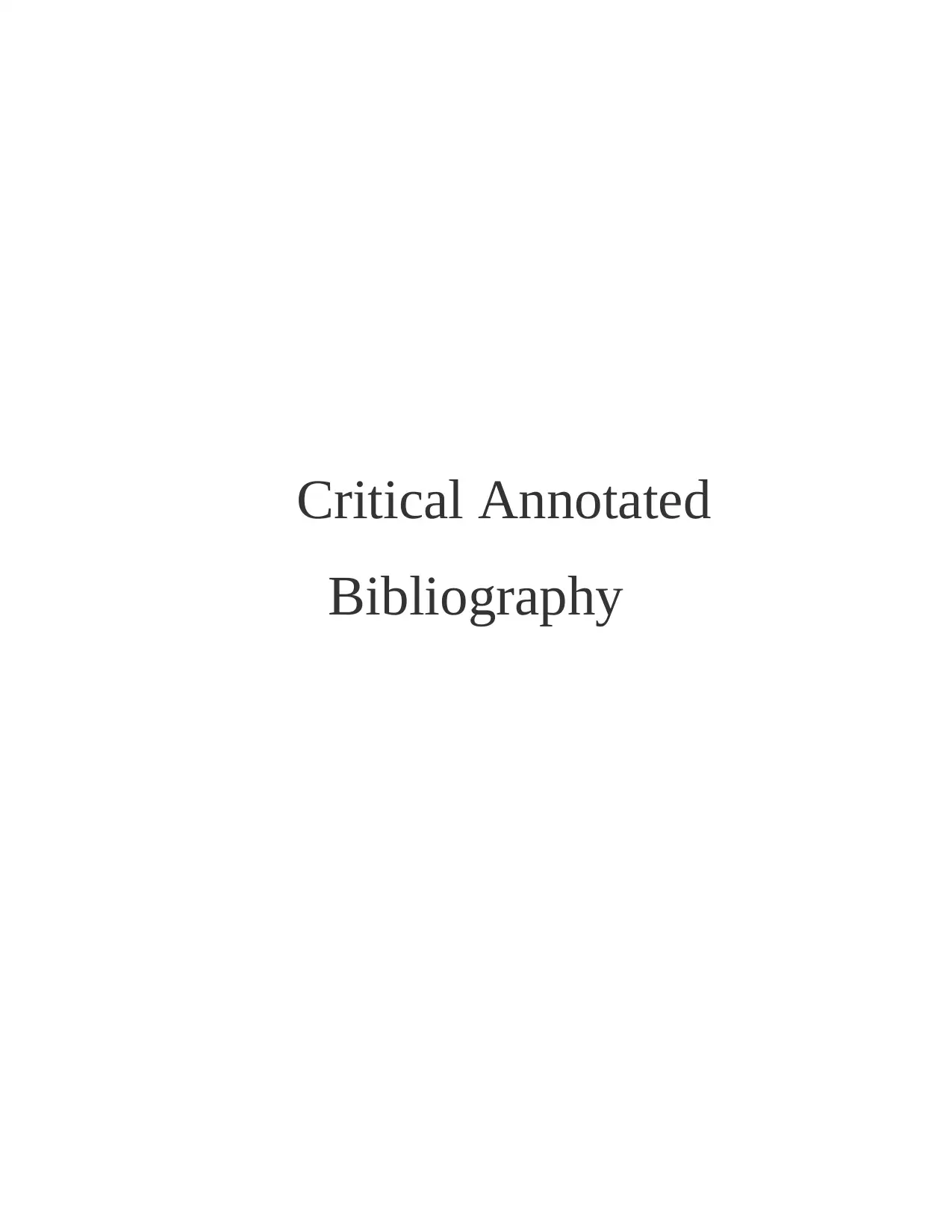
Critical Annotated
Bibliography
Bibliography
Paraphrase This Document
Need a fresh take? Get an instant paraphrase of this document with our AI Paraphraser

Table of Contents
ANNOTATED BIBLIOGRAPHY..................................................................................................1
SYNTHESIS OF THE ARTICLES.................................................................................................4
REFERENCES................................................................................................................................6
ANNOTATED BIBLIOGRAPHY..................................................................................................1
SYNTHESIS OF THE ARTICLES.................................................................................................4
REFERENCES................................................................................................................................6
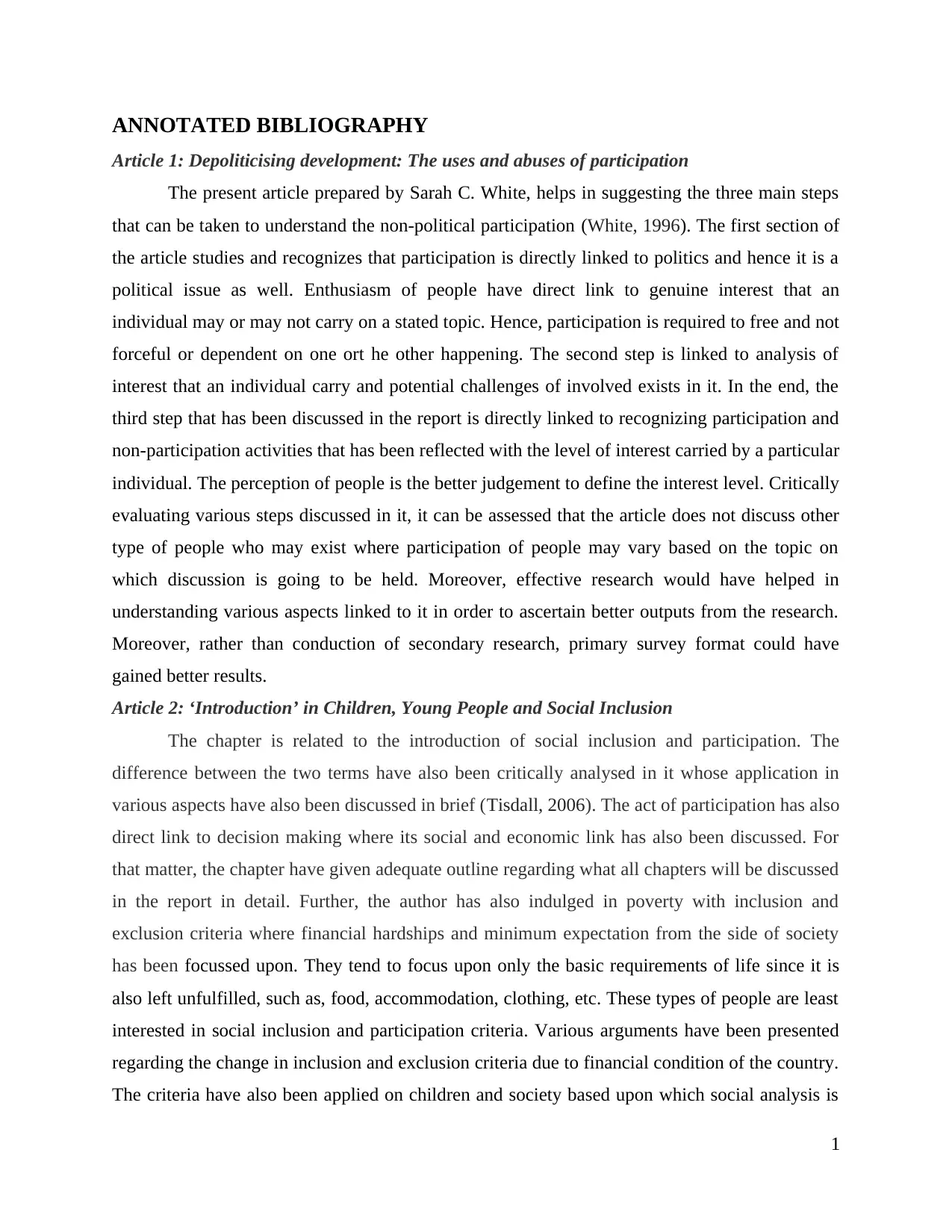
ANNOTATED BIBLIOGRAPHY
Article 1: Depoliticising development: The uses and abuses of participation
The present article prepared by Sarah C. White, helps in suggesting the three main steps
that can be taken to understand the non-political participation (White, 1996). The first section of
the article studies and recognizes that participation is directly linked to politics and hence it is a
political issue as well. Enthusiasm of people have direct link to genuine interest that an
individual may or may not carry on a stated topic. Hence, participation is required to free and not
forceful or dependent on one ort he other happening. The second step is linked to analysis of
interest that an individual carry and potential challenges of involved exists in it. In the end, the
third step that has been discussed in the report is directly linked to recognizing participation and
non-participation activities that has been reflected with the level of interest carried by a particular
individual. The perception of people is the better judgement to define the interest level. Critically
evaluating various steps discussed in it, it can be assessed that the article does not discuss other
type of people who may exist where participation of people may vary based on the topic on
which discussion is going to be held. Moreover, effective research would have helped in
understanding various aspects linked to it in order to ascertain better outputs from the research.
Moreover, rather than conduction of secondary research, primary survey format could have
gained better results.
Article 2: ‘Introduction’ in Children, Young People and Social Inclusion
The chapter is related to the introduction of social inclusion and participation. The
difference between the two terms have also been critically analysed in it whose application in
various aspects have also been discussed in brief (Tisdall, 2006). The act of participation has also
direct link to decision making where its social and economic link has also been discussed. For
that matter, the chapter have given adequate outline regarding what all chapters will be discussed
in the report in detail. Further, the author has also indulged in poverty with inclusion and
exclusion criteria where financial hardships and minimum expectation from the side of society
has been focussed upon. They tend to focus upon only the basic requirements of life since it is
also left unfulfilled, such as, food, accommodation, clothing, etc. These types of people are least
interested in social inclusion and participation criteria. Various arguments have been presented
regarding the change in inclusion and exclusion criteria due to financial condition of the country.
The criteria have also been applied on children and society based upon which social analysis is
1
Article 1: Depoliticising development: The uses and abuses of participation
The present article prepared by Sarah C. White, helps in suggesting the three main steps
that can be taken to understand the non-political participation (White, 1996). The first section of
the article studies and recognizes that participation is directly linked to politics and hence it is a
political issue as well. Enthusiasm of people have direct link to genuine interest that an
individual may or may not carry on a stated topic. Hence, participation is required to free and not
forceful or dependent on one ort he other happening. The second step is linked to analysis of
interest that an individual carry and potential challenges of involved exists in it. In the end, the
third step that has been discussed in the report is directly linked to recognizing participation and
non-participation activities that has been reflected with the level of interest carried by a particular
individual. The perception of people is the better judgement to define the interest level. Critically
evaluating various steps discussed in it, it can be assessed that the article does not discuss other
type of people who may exist where participation of people may vary based on the topic on
which discussion is going to be held. Moreover, effective research would have helped in
understanding various aspects linked to it in order to ascertain better outputs from the research.
Moreover, rather than conduction of secondary research, primary survey format could have
gained better results.
Article 2: ‘Introduction’ in Children, Young People and Social Inclusion
The chapter is related to the introduction of social inclusion and participation. The
difference between the two terms have also been critically analysed in it whose application in
various aspects have also been discussed in brief (Tisdall, 2006). The act of participation has also
direct link to decision making where its social and economic link has also been discussed. For
that matter, the chapter have given adequate outline regarding what all chapters will be discussed
in the report in detail. Further, the author has also indulged in poverty with inclusion and
exclusion criteria where financial hardships and minimum expectation from the side of society
has been focussed upon. They tend to focus upon only the basic requirements of life since it is
also left unfulfilled, such as, food, accommodation, clothing, etc. These types of people are least
interested in social inclusion and participation criteria. Various arguments have been presented
regarding the change in inclusion and exclusion criteria due to financial condition of the country.
The criteria have also been applied on children and society based upon which social analysis is
1
⊘ This is a preview!⊘
Do you want full access?
Subscribe today to unlock all pages.

Trusted by 1+ million students worldwide
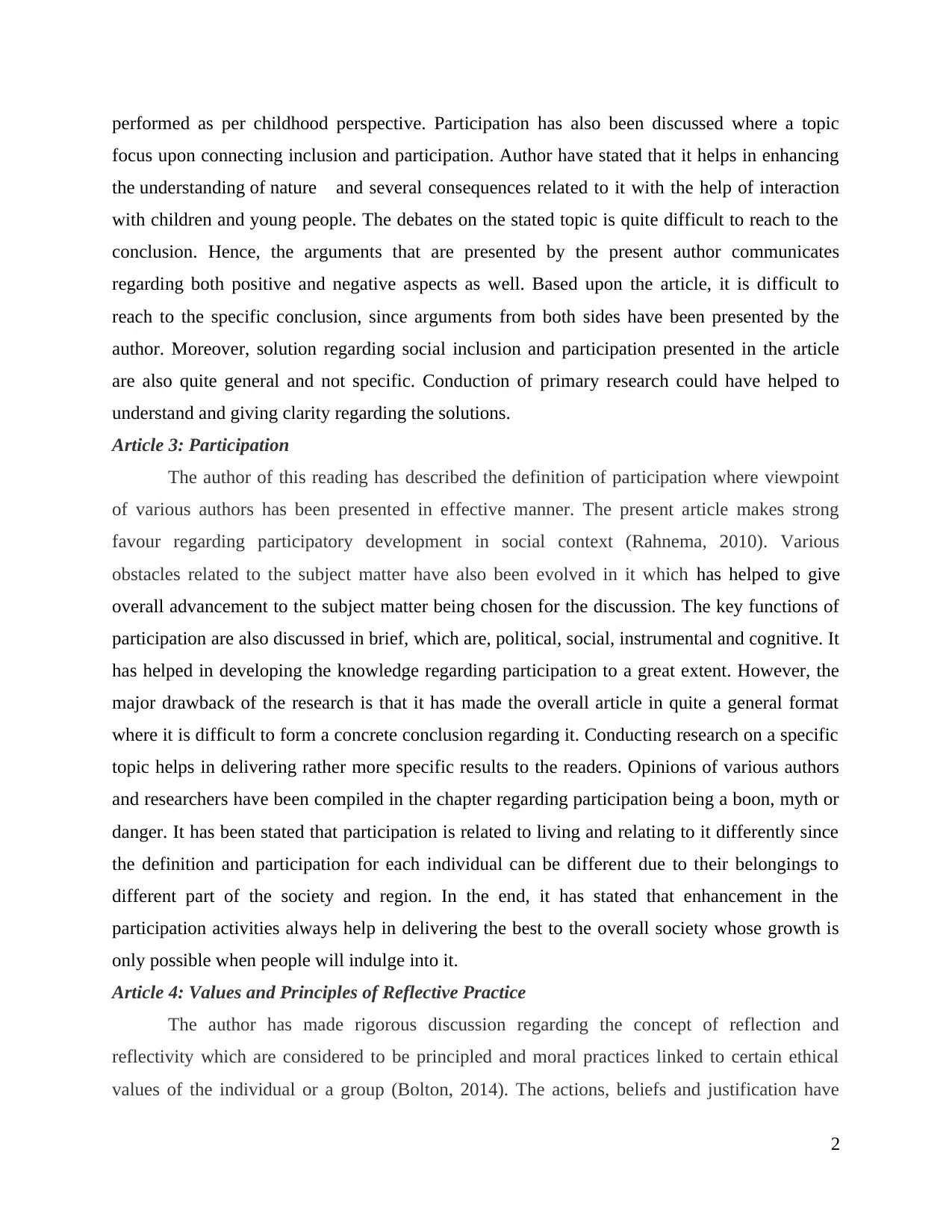
performed as per childhood perspective. Participation has also been discussed where a topic
focus upon connecting inclusion and participation. Author have stated that it helps in enhancing
the understanding of nature and several consequences related to it with the help of interaction
with children and young people. The debates on the stated topic is quite difficult to reach to the
conclusion. Hence, the arguments that are presented by the present author communicates
regarding both positive and negative aspects as well. Based upon the article, it is difficult to
reach to the specific conclusion, since arguments from both sides have been presented by the
author. Moreover, solution regarding social inclusion and participation presented in the article
are also quite general and not specific. Conduction of primary research could have helped to
understand and giving clarity regarding the solutions.
Article 3: Participation
The author of this reading has described the definition of participation where viewpoint
of various authors has been presented in effective manner. The present article makes strong
favour regarding participatory development in social context (Rahnema, 2010). Various
obstacles related to the subject matter have also been evolved in it which has helped to give
overall advancement to the subject matter being chosen for the discussion. The key functions of
participation are also discussed in brief, which are, political, social, instrumental and cognitive. It
has helped in developing the knowledge regarding participation to a great extent. However, the
major drawback of the research is that it has made the overall article in quite a general format
where it is difficult to form a concrete conclusion regarding it. Conducting research on a specific
topic helps in delivering rather more specific results to the readers. Opinions of various authors
and researchers have been compiled in the chapter regarding participation being a boon, myth or
danger. It has been stated that participation is related to living and relating to it differently since
the definition and participation for each individual can be different due to their belongings to
different part of the society and region. In the end, it has stated that enhancement in the
participation activities always help in delivering the best to the overall society whose growth is
only possible when people will indulge into it.
Article 4: Values and Principles of Reflective Practice
The author has made rigorous discussion regarding the concept of reflection and
reflectivity which are considered to be principled and moral practices linked to certain ethical
values of the individual or a group (Bolton, 2014). The actions, beliefs and justification have
2
focus upon connecting inclusion and participation. Author have stated that it helps in enhancing
the understanding of nature and several consequences related to it with the help of interaction
with children and young people. The debates on the stated topic is quite difficult to reach to the
conclusion. Hence, the arguments that are presented by the present author communicates
regarding both positive and negative aspects as well. Based upon the article, it is difficult to
reach to the specific conclusion, since arguments from both sides have been presented by the
author. Moreover, solution regarding social inclusion and participation presented in the article
are also quite general and not specific. Conduction of primary research could have helped to
understand and giving clarity regarding the solutions.
Article 3: Participation
The author of this reading has described the definition of participation where viewpoint
of various authors has been presented in effective manner. The present article makes strong
favour regarding participatory development in social context (Rahnema, 2010). Various
obstacles related to the subject matter have also been evolved in it which has helped to give
overall advancement to the subject matter being chosen for the discussion. The key functions of
participation are also discussed in brief, which are, political, social, instrumental and cognitive. It
has helped in developing the knowledge regarding participation to a great extent. However, the
major drawback of the research is that it has made the overall article in quite a general format
where it is difficult to form a concrete conclusion regarding it. Conducting research on a specific
topic helps in delivering rather more specific results to the readers. Opinions of various authors
and researchers have been compiled in the chapter regarding participation being a boon, myth or
danger. It has been stated that participation is related to living and relating to it differently since
the definition and participation for each individual can be different due to their belongings to
different part of the society and region. In the end, it has stated that enhancement in the
participation activities always help in delivering the best to the overall society whose growth is
only possible when people will indulge into it.
Article 4: Values and Principles of Reflective Practice
The author has made rigorous discussion regarding the concept of reflection and
reflectivity which are considered to be principled and moral practices linked to certain ethical
values of the individual or a group (Bolton, 2014). The actions, beliefs and justification have
2
Paraphrase This Document
Need a fresh take? Get an instant paraphrase of this document with our AI Paraphraser
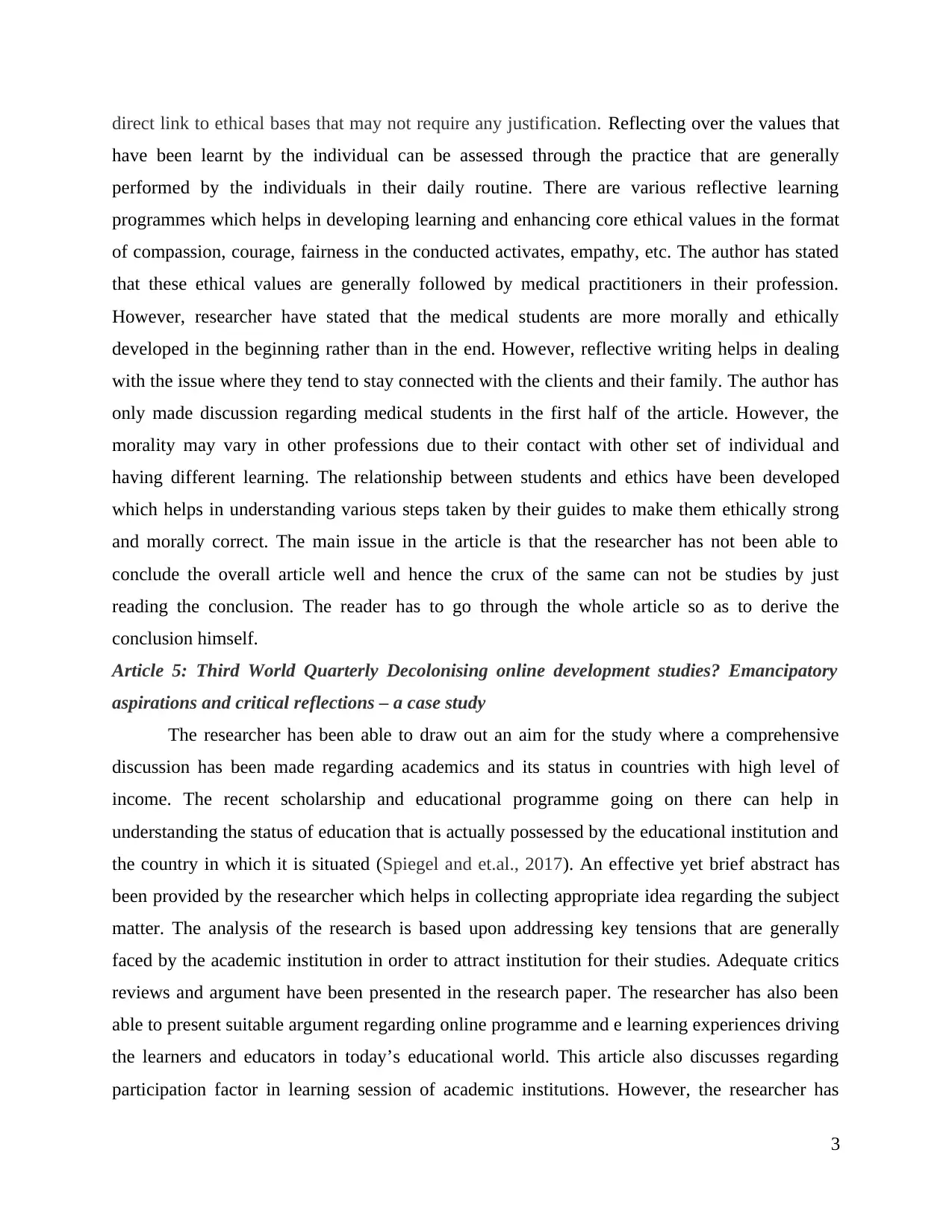
direct link to ethical bases that may not require any justification. Reflecting over the values that
have been learnt by the individual can be assessed through the practice that are generally
performed by the individuals in their daily routine. There are various reflective learning
programmes which helps in developing learning and enhancing core ethical values in the format
of compassion, courage, fairness in the conducted activates, empathy, etc. The author has stated
that these ethical values are generally followed by medical practitioners in their profession.
However, researcher have stated that the medical students are more morally and ethically
developed in the beginning rather than in the end. However, reflective writing helps in dealing
with the issue where they tend to stay connected with the clients and their family. The author has
only made discussion regarding medical students in the first half of the article. However, the
morality may vary in other professions due to their contact with other set of individual and
having different learning. The relationship between students and ethics have been developed
which helps in understanding various steps taken by their guides to make them ethically strong
and morally correct. The main issue in the article is that the researcher has not been able to
conclude the overall article well and hence the crux of the same can not be studies by just
reading the conclusion. The reader has to go through the whole article so as to derive the
conclusion himself.
Article 5: Third World Quarterly Decolonising online development studies? Emancipatory
aspirations and critical reflections – a case study
The researcher has been able to draw out an aim for the study where a comprehensive
discussion has been made regarding academics and its status in countries with high level of
income. The recent scholarship and educational programme going on there can help in
understanding the status of education that is actually possessed by the educational institution and
the country in which it is situated (Spiegel and et.al., 2017). An effective yet brief abstract has
been provided by the researcher which helps in collecting appropriate idea regarding the subject
matter. The analysis of the research is based upon addressing key tensions that are generally
faced by the academic institution in order to attract institution for their studies. Adequate critics
reviews and argument have been presented in the research paper. The researcher has also been
able to present suitable argument regarding online programme and e learning experiences driving
the learners and educators in today’s educational world. This article also discusses regarding
participation factor in learning session of academic institutions. However, the researcher has
3
have been learnt by the individual can be assessed through the practice that are generally
performed by the individuals in their daily routine. There are various reflective learning
programmes which helps in developing learning and enhancing core ethical values in the format
of compassion, courage, fairness in the conducted activates, empathy, etc. The author has stated
that these ethical values are generally followed by medical practitioners in their profession.
However, researcher have stated that the medical students are more morally and ethically
developed in the beginning rather than in the end. However, reflective writing helps in dealing
with the issue where they tend to stay connected with the clients and their family. The author has
only made discussion regarding medical students in the first half of the article. However, the
morality may vary in other professions due to their contact with other set of individual and
having different learning. The relationship between students and ethics have been developed
which helps in understanding various steps taken by their guides to make them ethically strong
and morally correct. The main issue in the article is that the researcher has not been able to
conclude the overall article well and hence the crux of the same can not be studies by just
reading the conclusion. The reader has to go through the whole article so as to derive the
conclusion himself.
Article 5: Third World Quarterly Decolonising online development studies? Emancipatory
aspirations and critical reflections – a case study
The researcher has been able to draw out an aim for the study where a comprehensive
discussion has been made regarding academics and its status in countries with high level of
income. The recent scholarship and educational programme going on there can help in
understanding the status of education that is actually possessed by the educational institution and
the country in which it is situated (Spiegel and et.al., 2017). An effective yet brief abstract has
been provided by the researcher which helps in collecting appropriate idea regarding the subject
matter. The analysis of the research is based upon addressing key tensions that are generally
faced by the academic institution in order to attract institution for their studies. Adequate critics
reviews and argument have been presented in the research paper. The researcher has also been
able to present suitable argument regarding online programme and e learning experiences driving
the learners and educators in today’s educational world. This article also discusses regarding
participation factor in learning session of academic institutions. However, the researcher has
3
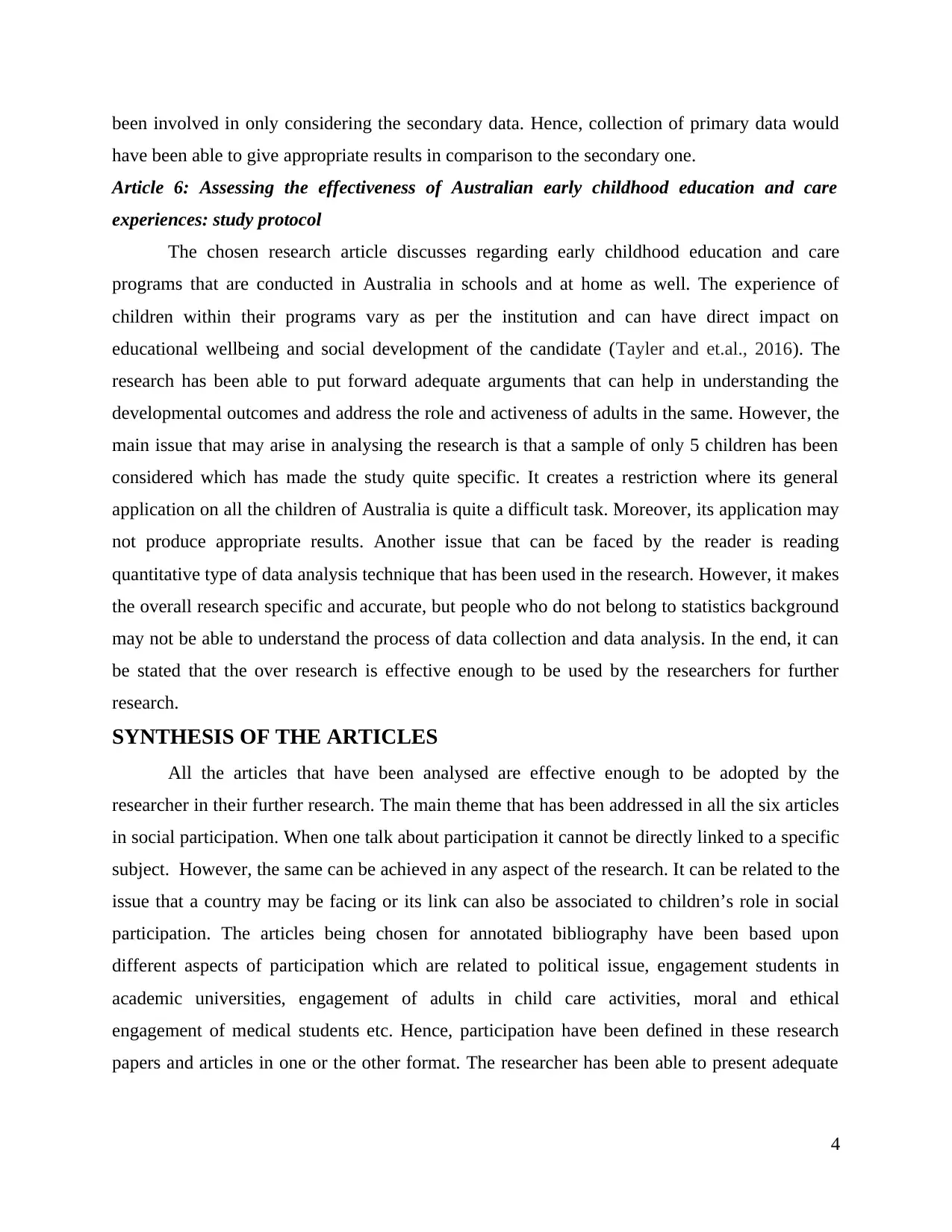
been involved in only considering the secondary data. Hence, collection of primary data would
have been able to give appropriate results in comparison to the secondary one.
Article 6: Assessing the effectiveness of Australian early childhood education and care
experiences: study protocol
The chosen research article discusses regarding early childhood education and care
programs that are conducted in Australia in schools and at home as well. The experience of
children within their programs vary as per the institution and can have direct impact on
educational wellbeing and social development of the candidate (Tayler and et.al., 2016). The
research has been able to put forward adequate arguments that can help in understanding the
developmental outcomes and address the role and activeness of adults in the same. However, the
main issue that may arise in analysing the research is that a sample of only 5 children has been
considered which has made the study quite specific. It creates a restriction where its general
application on all the children of Australia is quite a difficult task. Moreover, its application may
not produce appropriate results. Another issue that can be faced by the reader is reading
quantitative type of data analysis technique that has been used in the research. However, it makes
the overall research specific and accurate, but people who do not belong to statistics background
may not be able to understand the process of data collection and data analysis. In the end, it can
be stated that the over research is effective enough to be used by the researchers for further
research.
SYNTHESIS OF THE ARTICLES
All the articles that have been analysed are effective enough to be adopted by the
researcher in their further research. The main theme that has been addressed in all the six articles
in social participation. When one talk about participation it cannot be directly linked to a specific
subject. However, the same can be achieved in any aspect of the research. It can be related to the
issue that a country may be facing or its link can also be associated to children’s role in social
participation. The articles being chosen for annotated bibliography have been based upon
different aspects of participation which are related to political issue, engagement students in
academic universities, engagement of adults in child care activities, moral and ethical
engagement of medical students etc. Hence, participation have been defined in these research
papers and articles in one or the other format. The researcher has been able to present adequate
4
have been able to give appropriate results in comparison to the secondary one.
Article 6: Assessing the effectiveness of Australian early childhood education and care
experiences: study protocol
The chosen research article discusses regarding early childhood education and care
programs that are conducted in Australia in schools and at home as well. The experience of
children within their programs vary as per the institution and can have direct impact on
educational wellbeing and social development of the candidate (Tayler and et.al., 2016). The
research has been able to put forward adequate arguments that can help in understanding the
developmental outcomes and address the role and activeness of adults in the same. However, the
main issue that may arise in analysing the research is that a sample of only 5 children has been
considered which has made the study quite specific. It creates a restriction where its general
application on all the children of Australia is quite a difficult task. Moreover, its application may
not produce appropriate results. Another issue that can be faced by the reader is reading
quantitative type of data analysis technique that has been used in the research. However, it makes
the overall research specific and accurate, but people who do not belong to statistics background
may not be able to understand the process of data collection and data analysis. In the end, it can
be stated that the over research is effective enough to be used by the researchers for further
research.
SYNTHESIS OF THE ARTICLES
All the articles that have been analysed are effective enough to be adopted by the
researcher in their further research. The main theme that has been addressed in all the six articles
in social participation. When one talk about participation it cannot be directly linked to a specific
subject. However, the same can be achieved in any aspect of the research. It can be related to the
issue that a country may be facing or its link can also be associated to children’s role in social
participation. The articles being chosen for annotated bibliography have been based upon
different aspects of participation which are related to political issue, engagement students in
academic universities, engagement of adults in child care activities, moral and ethical
engagement of medical students etc. Hence, participation have been defined in these research
papers and articles in one or the other format. The researcher has been able to present adequate
4
⊘ This is a preview!⊘
Do you want full access?
Subscribe today to unlock all pages.

Trusted by 1+ million students worldwide
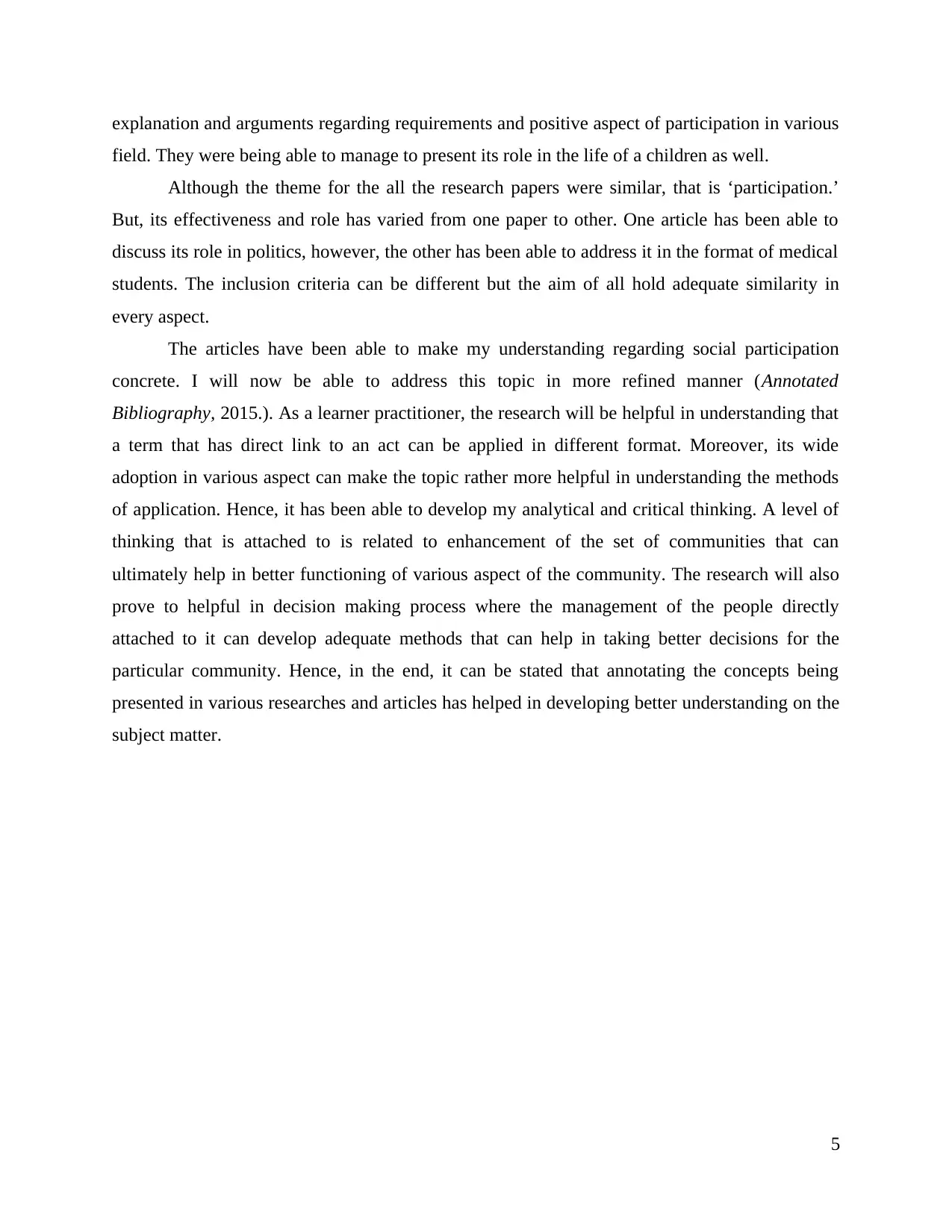
explanation and arguments regarding requirements and positive aspect of participation in various
field. They were being able to manage to present its role in the life of a children as well.
Although the theme for the all the research papers were similar, that is ‘participation.’
But, its effectiveness and role has varied from one paper to other. One article has been able to
discuss its role in politics, however, the other has been able to address it in the format of medical
students. The inclusion criteria can be different but the aim of all hold adequate similarity in
every aspect.
The articles have been able to make my understanding regarding social participation
concrete. I will now be able to address this topic in more refined manner (Annotated
Bibliography, 2015.). As a learner practitioner, the research will be helpful in understanding that
a term that has direct link to an act can be applied in different format. Moreover, its wide
adoption in various aspect can make the topic rather more helpful in understanding the methods
of application. Hence, it has been able to develop my analytical and critical thinking. A level of
thinking that is attached to is related to enhancement of the set of communities that can
ultimately help in better functioning of various aspect of the community. The research will also
prove to helpful in decision making process where the management of the people directly
attached to it can develop adequate methods that can help in taking better decisions for the
particular community. Hence, in the end, it can be stated that annotating the concepts being
presented in various researches and articles has helped in developing better understanding on the
subject matter.
5
field. They were being able to manage to present its role in the life of a children as well.
Although the theme for the all the research papers were similar, that is ‘participation.’
But, its effectiveness and role has varied from one paper to other. One article has been able to
discuss its role in politics, however, the other has been able to address it in the format of medical
students. The inclusion criteria can be different but the aim of all hold adequate similarity in
every aspect.
The articles have been able to make my understanding regarding social participation
concrete. I will now be able to address this topic in more refined manner (Annotated
Bibliography, 2015.). As a learner practitioner, the research will be helpful in understanding that
a term that has direct link to an act can be applied in different format. Moreover, its wide
adoption in various aspect can make the topic rather more helpful in understanding the methods
of application. Hence, it has been able to develop my analytical and critical thinking. A level of
thinking that is attached to is related to enhancement of the set of communities that can
ultimately help in better functioning of various aspect of the community. The research will also
prove to helpful in decision making process where the management of the people directly
attached to it can develop adequate methods that can help in taking better decisions for the
particular community. Hence, in the end, it can be stated that annotating the concepts being
presented in various researches and articles has helped in developing better understanding on the
subject matter.
5
Paraphrase This Document
Need a fresh take? Get an instant paraphrase of this document with our AI Paraphraser
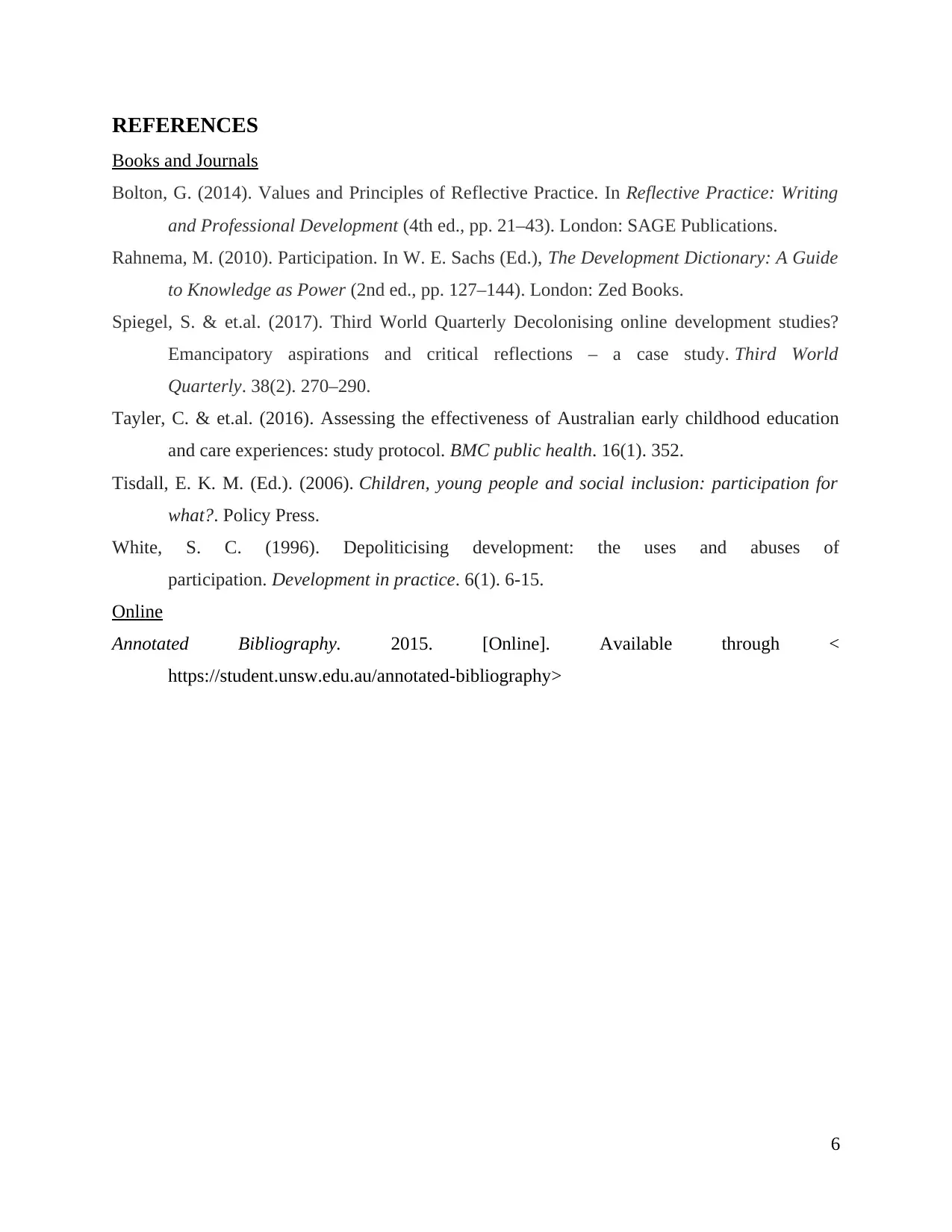
REFERENCES
Books and Journals
Bolton, G. (2014). Values and Principles of Reflective Practice. In Reflective Practice: Writing
and Professional Development (4th ed., pp. 21–43). London: SAGE Publications.
Rahnema, M. (2010). Participation. In W. E. Sachs (Ed.), The Development Dictionary: A Guide
to Knowledge as Power (2nd ed., pp. 127–144). London: Zed Books.
Spiegel, S. & et.al. (2017). Third World Quarterly Decolonising online development studies?
Emancipatory aspirations and critical reflections – a case study. Third World
Quarterly. 38(2). 270–290.
Tayler, C. & et.al. (2016). Assessing the effectiveness of Australian early childhood education
and care experiences: study protocol. BMC public health. 16(1). 352.
Tisdall, E. K. M. (Ed.). (2006). Children, young people and social inclusion: participation for
what?. Policy Press.
White, S. C. (1996). Depoliticising development: the uses and abuses of
participation. Development in practice. 6(1). 6-15.
Online
Annotated Bibliography. 2015. [Online]. Available through <
https://student.unsw.edu.au/annotated-bibliography>
6
Books and Journals
Bolton, G. (2014). Values and Principles of Reflective Practice. In Reflective Practice: Writing
and Professional Development (4th ed., pp. 21–43). London: SAGE Publications.
Rahnema, M. (2010). Participation. In W. E. Sachs (Ed.), The Development Dictionary: A Guide
to Knowledge as Power (2nd ed., pp. 127–144). London: Zed Books.
Spiegel, S. & et.al. (2017). Third World Quarterly Decolonising online development studies?
Emancipatory aspirations and critical reflections – a case study. Third World
Quarterly. 38(2). 270–290.
Tayler, C. & et.al. (2016). Assessing the effectiveness of Australian early childhood education
and care experiences: study protocol. BMC public health. 16(1). 352.
Tisdall, E. K. M. (Ed.). (2006). Children, young people and social inclusion: participation for
what?. Policy Press.
White, S. C. (1996). Depoliticising development: the uses and abuses of
participation. Development in practice. 6(1). 6-15.
Online
Annotated Bibliography. 2015. [Online]. Available through <
https://student.unsw.edu.au/annotated-bibliography>
6
1 out of 8
Related Documents
Your All-in-One AI-Powered Toolkit for Academic Success.
+13062052269
info@desklib.com
Available 24*7 on WhatsApp / Email
![[object Object]](/_next/static/media/star-bottom.7253800d.svg)
Unlock your academic potential
Copyright © 2020–2026 A2Z Services. All Rights Reserved. Developed and managed by ZUCOL.





